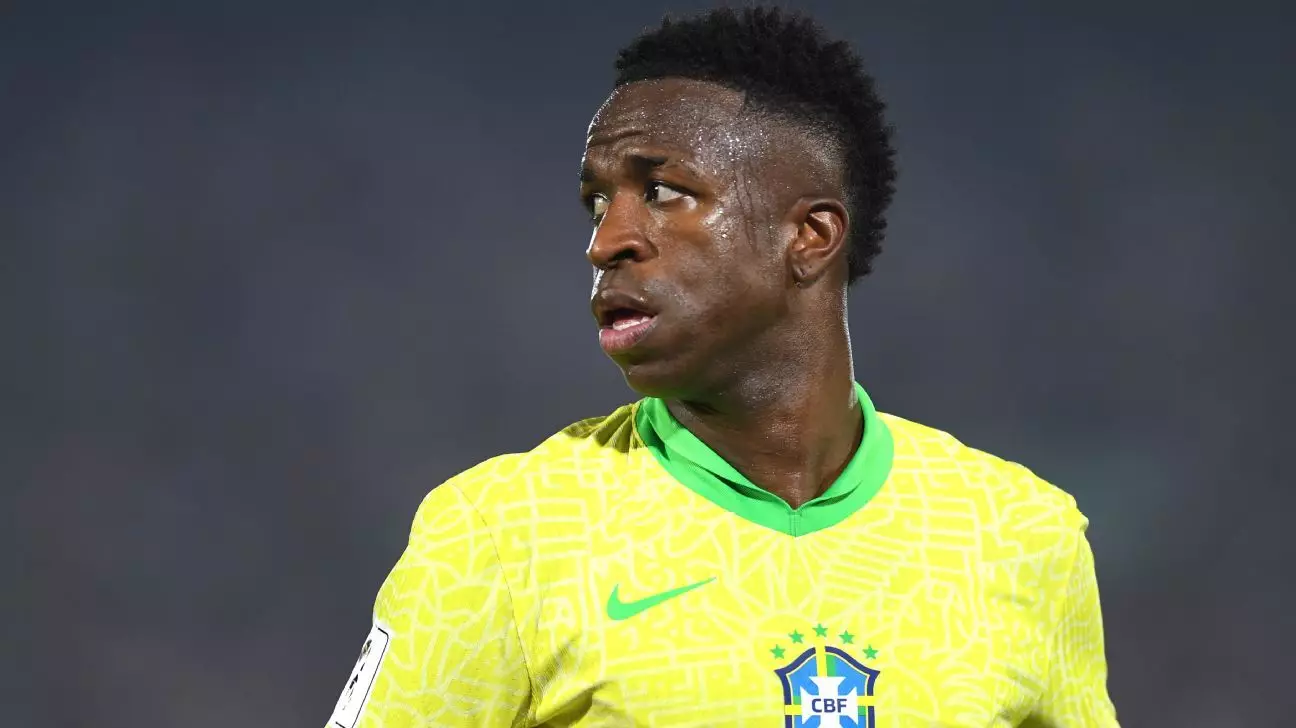Vinícius Júnior’s recent commentary following Brazil’s staggering 4-1 defeat to Argentina has sent shockwaves through the footballing world. This match, part of the World Cup qualifying series, marked a significant turning point for a nation that has long been synonymous with footballing excellence. The absence of Lionel Messi was supposed to offer a glimmer of hope for Brazil; instead, they were left with a helpless display that highlighted a need for serious reflection and recalibration. Júnior did not mince words in expressing his disappointment, acknowledging that both the players and coaching staff failed to rise to the occasion.
This loss was more than just a routine defeat; it was a resounding alarm bell. Brazil managed a meager shot on target, a statistic that starkly illustrates their struggles on the field. As Júnior articulated, “We have to rethink everything we’ve been doing,” emphasizing not only an urgent need for introspection but also the pressing reality of expectations from fans. The World Cup is around the corner, and Brazil’s historical legacy in football demands they not only qualify but also perform.
Building a New Identity: Lessons from the Rivalry
The conversation around Brazil’s approach to football is not merely about tactics but also about identity. Júnior pointed out the importance of learning from Argentina’s collective experience. With their national squad enjoying a prolonged period of cohesion and success, the contrast with Brazil’s disjointed efforts is striking. “Argentina have been working together for a long time,” he remarked, suggesting that continuity breeds success—and this is a lesson Brazil must heed if they hope to forge their own winning path.
It’s clear that Brazil has not only lost games but also a sense of direction. Ahead of the match, Raphinha’s provocative comments about overpowering Argentina only added fuel to the rivalry’s intense flames. Julián Álvarez’s reactions underscored how pre-match bravado can backfire spectacularly, revealing an apparent clash in mentalities. While provoking the opposition can serve as motivation, miscalculated bravado can show a lack of respect for the opposing side’s capabilities, a sentiment echoed by Argentina’s Emiliano Martínez.
In today’s football landscape, tactical awareness and mental composure are just as crucial as physical prowess. Brazil’s players must recognize the importance of humility and discipline, even while seeking to instill fear in their opponents.
The Pressure Pile-Up on Dorival Júnior
The weight of responsibility in the wake of Brazil’s recent failures largely rests on the shoulders of Dorival Júnior, who admitted that the defeat was one of the most delicate moments of his managerial career. His acknowledgment of the team’s shortcomings could indicate a sense of accountability, yet the uncertainty surrounding his future raises questions about the effectiveness of his leadership style.
With media speculation swirling around potential replacements—most notably Carlo Ancelotti—there is a palpable sense of urgency for Brazil to identify a manager capable of nurturing a new footballing philosophy. Ancelotti, a managerial heavyweight, represents a type of stability that could be beneficial to a team in desperate need of direction. Yet, the rising tide of pressure from fans and the media only complicates Dorival’s challenge: can he genuinely turn this ship around before it’s too late?
The Football Confederation’s silence following the alarming defeat adds to the tension. While CBF president Ednaldo Rodrigues did not speak to the media, the underlying concerns about Brazil’s ability to clinch a World Cup spot reveal a disconnected leadership at a crucial time.
Looking Ahead: Brasil, The Land of Great Expectations
The future of Brazilian football hinges on how well the national team can regroup and reformulate their approach. The upcoming World Cup qualifiers against Ecuador and Paraguay serve as both a testing ground and a potential turning point. The fans demand excellence, and Brazil’s illustrious footballing heritage obliges them to deliver.
One cannot underestimate the emotional and psychological component of international football. The Brazilian squad needs to embrace the weight of their storied legacy and channel that pressure into positivity. As Vinícius Júnior aptly noted, “We’re Brazilians and we never give up.” This mindset must permeate the players and coaching staff alike if they are to rise from the ashes of this humiliating defeat.
The painful lessons from the defeat to Argentina could set the stage for a necessary evolution within the team. The key will be embracing these challenges head-on and transforming them into opportunities for growth. With a renewed sense of purpose, Brazil can leverage their rich history to not only qualify for the World Cup but also to remind the world of their inherent strength and flair.

